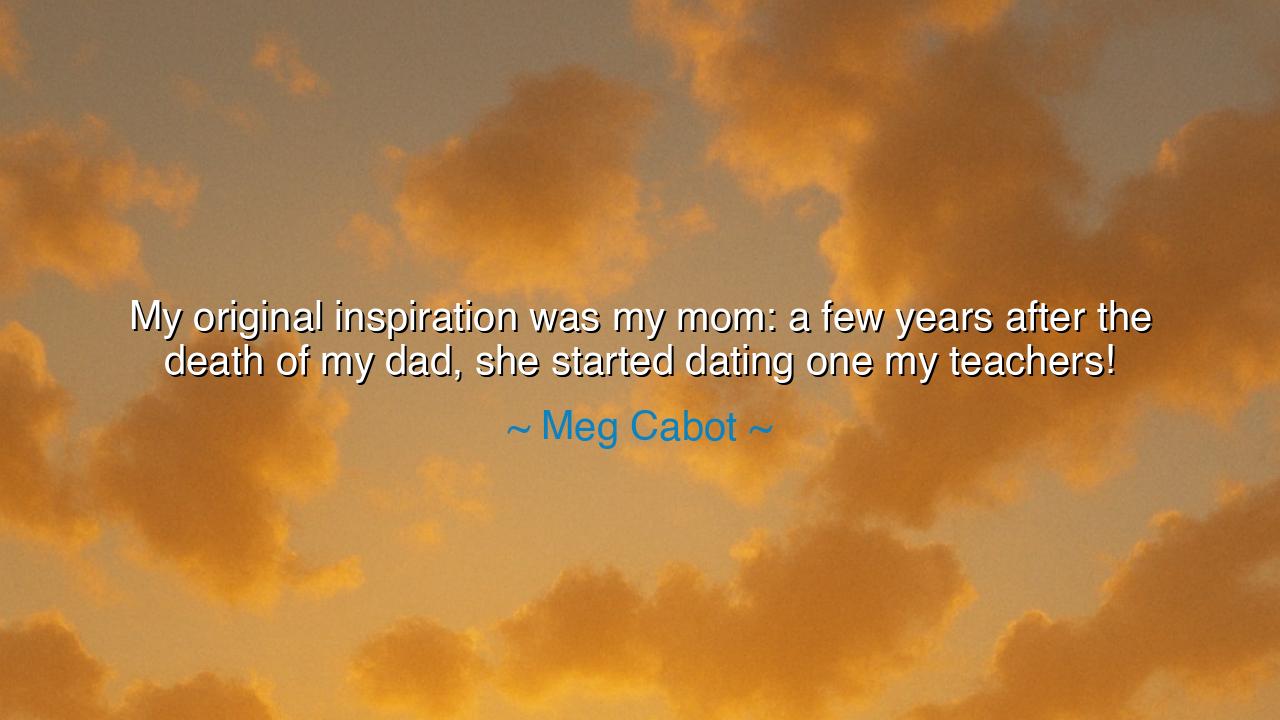
My original inspiration was my mom: a few years after the death
My original inspiration was my mom: a few years after the death of my dad, she started dating one my teachers!






“My original inspiration was my mom: a few years after the death of my dad, she started dating one of my teachers!” Thus spoke Meg Cabot, the beloved author whose stories have filled countless hearts with laughter, courage, and hope. At first glance, her words appear light — a humorous confession, perhaps, of the strange turns life can take. Yet within them lies a deeper current of meaning — a meditation on resilience, renewal, and the surprising ways in which inspiration is born from the tangled threads of real life. Her quote is not merely about romance or family; it is about the human spirit’s capacity to rebuild, even after loss, and to find light again in unexpected places.
When Cabot recalls her mother’s act — beginning anew after the death of her husband — she speaks to one of the oldest truths known to humankind: that life, though it breaks us, also beckons us to rise. Her mother’s story is that of courageous renewal, of a woman who refused to let grief define her days. To begin again, to open the heart after tragedy, is no small act; it is a defiance against despair, a reclaiming of joy in a world that once seemed empty. In many ways, this story reflects the timeless cycle of loss and rebirth that the ancients themselves revered — for even in the coldest winter, they believed, the seeds of spring were already stirring beneath the earth.
The origin of Cabot’s inspiration is deeply personal, yet profoundly universal. She, the daughter watching her mother love again, saw not scandal or shock, but strength. The act of her mother dating her teacher — an event that might seem awkward or humorous — became for her a lens through which to view human complexity. In it, she glimpsed how people, even those closest to us, can surprise us, can teach us anew what it means to live authentically and fearlessly. The child within her might have blushed or balked, but the writer within her recognized a truth that would later shape her art: that stories worth telling are born from real, imperfect life, not from idealized fantasy.
In the world of the ancients, such renewal was often personified through myth. Consider the goddess Demeter, whose grief for her lost daughter Persephone turned the earth barren. Yet when her child returned, Demeter allowed the fields to bloom once more. From loss came renewal; from despair, fertility. So too in Cabot’s life did the loss of her father lead, indirectly, to a renewal of spirit through her mother’s courage. It was not the denial of grief that inspired her, but the transformation of it — the alchemy by which sorrow is turned into understanding. This is the soil from which art grows: the ability to take pain, strangeness, and even embarrassment, and turn them into meaning.
There is also humor in Cabot’s reflection — a laughter born not of mockery, but of wisdom. For laughter is one of humanity’s oldest shields against sorrow. It is the sound of the heart choosing joy despite its scars. In her telling, Cabot reveals that the events which might seem awkward or even uncomfortable can, in time, become stories that heal. Her mother’s choice — daring, perhaps unconventional — became a testament to the freedom of the heart, a reminder that love follows no rule but its own. Cabot learned, as all great storytellers do, that even the strangest turns of life carry lessons if one watches with empathy instead of judgment.
Through this moment, Cabot found her inspiration — not in perfection, but in the messy, unfiltered truth of human experience. Her writing, celebrated for its honesty and warmth, reflects this origin. Like her mother, she understands that life is not about living flawlessly, but about living fully. Her art became a vessel through which she could transform the peculiarities of her youth into stories that connect with the universal — love after loss, laughter after pain, the discovery of strength in vulnerability.
And so, my listener, let this tale remind you: inspiration often hides within the ordinary and the uncomfortable. Do not seek it only in greatness or triumph; seek it also in the small acts of courage that unfold in daily life. When pain comes, allow it to shape you but not to shatter you. When laughter arrives, let it mend what grief has torn. Like Meg Cabot’s mother, dare to begin again; like Cabot herself, learn to see story and meaning in the strangeness of existence.
For this is the lesson that her words carry across time: life’s beauty is born from its imperfections. Inspiration does not descend from the heavens — it grows from the soil of experience, watered by tears, brightened by laughter. If we open our hearts as Cabot did, even the awkward and the unexpected can become sacred teachers. For as long as we live, we are all both students and storytellers — learning, like her mother, how to love again, and like Cabot, how to turn that love into something eternal.






AAdministratorAdministrator
Welcome, honored guests. Please leave a comment, we will respond soon